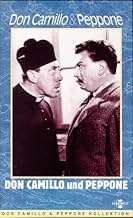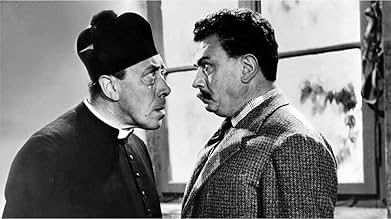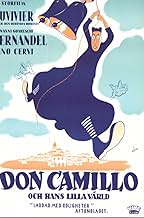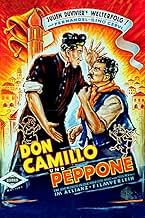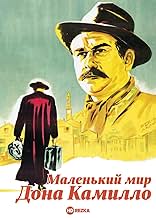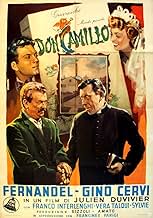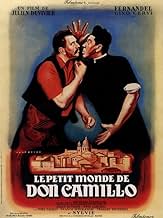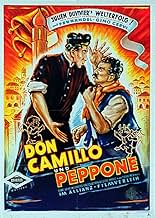AVALIAÇÃO DA IMDb
7,6/10
5,1 mil
SUA AVALIAÇÃO
Adicionar um enredo no seu idiomaA determined priest and a Communist mayor develop a grudging friendship in spite of their official rivalry.A determined priest and a Communist mayor develop a grudging friendship in spite of their official rivalry.A determined priest and a Communist mayor develop a grudging friendship in spite of their official rivalry.
- Direção
- Roteiristas
- Artistas
- Indicado para 1 prêmio BAFTA
- 3 vitórias e 3 indicações no total
Vera Talchi
- Gina Filotti
- (as Vera Talqui)
Charles Vissières
- Il Vescovo
- (as Charles Vissiere)
Clara Auteri Pepe
- Woman saying 'Viva Peppone!'
- (as Clara Auteri)
Manuel Gary
- Il delegato
- (as Manoel Gary)
Avaliações em destaque
Fernandel is Don Camillio, the reactionary village priest. Gino Cervi is Giuseppe 'Peppone' Bottazzi, the communist mayor and the fierce opponent of of Camillio. In their own little world, they engage in a fierce and time-honored struggle for the hearts, minds, souls and well-being of their community. Cervi has his organization and supporters. Camillio only only the voice of G*d to narrate the events and to reproach him when he fails in his work; however, since it's Orson Welles' voice, the honors are more than even in this loving little film by Julien Duvivier.
It's an odd film from Duvivier, whose movies often celebrated the unseen hand of fate, leading men to destruction. Yet in this movie, everyone knows who they are and what is important, even if they disagree fiercely. So the old teacher rails against stupidity and hopes for a pension; the young lovers re-enact Romeo and Juliet; and the communist brings his newborn child to be baptized as Giuseppi Stalin.
Perhaps it is the inherent humility of these people that makes Duvivier adore them. They do not fight their fates, but recognizing it, do their best within it. Duvivier made a sequel, and Fernandel repeated the role four times, his lugubrious face making him the perfect parish priest.
It's an odd film from Duvivier, whose movies often celebrated the unseen hand of fate, leading men to destruction. Yet in this movie, everyone knows who they are and what is important, even if they disagree fiercely. So the old teacher rails against stupidity and hopes for a pension; the young lovers re-enact Romeo and Juliet; and the communist brings his newborn child to be baptized as Giuseppi Stalin.
Perhaps it is the inherent humility of these people that makes Duvivier adore them. They do not fight their fates, but recognizing it, do their best within it. Duvivier made a sequel, and Fernandel repeated the role four times, his lugubrious face making him the perfect parish priest.
This is, and has been since I was a young boy, one of my favorite movies.
It's the story of a Catholic priest and a Communist mayor who are each others worst enemy and best friend. The dialogs are just great, but what I like most about these movies (there a are 5 in total) is that both main characters (Don Camillo and Peppone) are "real people". They act on impulse, say one thing but think the other, manipulate... they are real humans. When one of Peppone's people dies and asks for the church-bells to be rang at his funeral, Don Camillo refuses because he was no Catholic. Peppone orders a big bell to be placed in the town square which Don Camillo sabotages. The bell is broken and sounds horrible but at the end, Don Camillo rings his bells because "by asking for the bells, the boy was asking for God". This is one of these typical things I like about these movies.
I've got the good fortune I also understand French and can watch these movies in that language. I can't imagine what they would sound like in English but I would advice anyone to watch them in the French version. I hate dubbed movies and can't imagine Fernandel speaking English (although in one movie he does which is hilarious). But in all, I think even the English version still is one of the best movies ever made.
If you're not prejudiced against black and white and foreign movies, this is a movie you have to see. If you are, you don't know what you're missing.
It's the story of a Catholic priest and a Communist mayor who are each others worst enemy and best friend. The dialogs are just great, but what I like most about these movies (there a are 5 in total) is that both main characters (Don Camillo and Peppone) are "real people". They act on impulse, say one thing but think the other, manipulate... they are real humans. When one of Peppone's people dies and asks for the church-bells to be rang at his funeral, Don Camillo refuses because he was no Catholic. Peppone orders a big bell to be placed in the town square which Don Camillo sabotages. The bell is broken and sounds horrible but at the end, Don Camillo rings his bells because "by asking for the bells, the boy was asking for God". This is one of these typical things I like about these movies.
I've got the good fortune I also understand French and can watch these movies in that language. I can't imagine what they would sound like in English but I would advice anyone to watch them in the French version. I hate dubbed movies and can't imagine Fernandel speaking English (although in one movie he does which is hilarious). But in all, I think even the English version still is one of the best movies ever made.
If you're not prejudiced against black and white and foreign movies, this is a movie you have to see. If you are, you don't know what you're missing.
By the way, the version I watched was not dubbed but subtitled. I mention this because one of the reviewers talked about seeing a dubbed version but this was not available on the DVD I watched. And, if it had been, I would have chosen the captions regardless.
I did an odd thing. I accidentally put the second Don Camillo film ahead of the first one on my Netflix queue. So I saw the second one first. This is not that bad a thing, however, as the second film recapped what happened in the first film when it began. But, because I loved the second film so much, I couldn't wait to see the first.
This movie begins with the town in an uproar. It's a heavily divided town and the Communists have just won the election for mayor. The old guard is quite unhappy and the unhappiest is the town's priest, Don Camillo (Fernandel). And, through most of the film, he and the Mayor butt heads and fight like dogs. It's all quite silly but enjoyable.
An odd thing about the film, just as in the second, is that Don Camillo talks to Jesus--and Jesus talks back to him through the crucifix in the church! Some might find it a bit sacrilegious, but it seemed to be handled well. Also, the town's struggles is a good microcosm of post-war Italy, as the country was strongly divided between Communists and those who wanted a right-wing republic--a problem which didn't really get resolved until the 1980s.
All in all, a very good film that I enjoyed. However, please watch the next one--it gets even better.
I did an odd thing. I accidentally put the second Don Camillo film ahead of the first one on my Netflix queue. So I saw the second one first. This is not that bad a thing, however, as the second film recapped what happened in the first film when it began. But, because I loved the second film so much, I couldn't wait to see the first.
This movie begins with the town in an uproar. It's a heavily divided town and the Communists have just won the election for mayor. The old guard is quite unhappy and the unhappiest is the town's priest, Don Camillo (Fernandel). And, through most of the film, he and the Mayor butt heads and fight like dogs. It's all quite silly but enjoyable.
An odd thing about the film, just as in the second, is that Don Camillo talks to Jesus--and Jesus talks back to him through the crucifix in the church! Some might find it a bit sacrilegious, but it seemed to be handled well. Also, the town's struggles is a good microcosm of post-war Italy, as the country was strongly divided between Communists and those who wanted a right-wing republic--a problem which didn't really get resolved until the 1980s.
All in all, a very good film that I enjoyed. However, please watch the next one--it gets even better.
I think this is a very funny movie, Despite the fact it is a white&black film and you really can tell that it is placed on a certain time frame (end of 1940's - early 1950's), the plot is fun and universal. It gives you a glimpse of the life on a small Italian town, where simple things turns into hilarious situations, thanks to the strange relationship of friendship/rivalry between Don Camillo and Mayor Peppone. I was lucky to see the original french version (subtitled, of course) which is always better than hearing a translated version. I think that original voices -even if you do not understand the language- reveal the character's feelings, and give credibility to actor's performances. After the film, you get the impression that life is somewhat easier to cope with...
French comic actor Fernandel embodied the title role while remarkable Italian character actor Gino Cervi played his spiritual and political opponent. More than a rustic comedy, the film epitomizes the postwar political polarization in Italy and symbolizes the famous "compromesso storico"---historical compromise---under which Italy would long continue to be governed. This successful film spawned a series of popular sequels, mostly with the same two actors, all based on the Giovanni Guareschi novels. A point of clarification: this was a French-Italian co-production and was first released in the U.S. in its French-language version with English subtitles before the dubbed English version with narrator Orson Welles went into circulation. The Italian-language version, not readily available, is the most appropriate one.
Você sabia?
- CuriosidadesThe whole film was shot twice; there is a French and an Italien negative, that can be distinguished by details in editing and content (watch the position of the dog during the procession for example).
- Citações
Crocefisso: Where did you get that cigar, Camillo?
Don Camillo: Peppone had two. I think I took it without asking him. You know he believes in equal distribution of wealth.
- Versões alternativasGerman version runs 2 minutes shorter than the Italian original version.
- ConexõesFeatured in Cinema forever - Capolavori salvati (2001)
Principais escolhas
Faça login para avaliar e ver a lista de recomendações personalizadas
- How long is The Little World of Don Camillo?Fornecido pela Alexa
Detalhes
- Data de lançamento
- Países de origem
- Idiomas
- Também conhecido como
- Don Camillo
- Locações de filme
- Empresas de produção
- Consulte mais créditos da empresa na IMDbPro
- Tempo de duração
- 1 h 47 min(107 min)
- Cor
- Proporção
- 1.37 : 1
Contribua para esta página
Sugerir uma alteração ou adicionar conteúdo ausente

